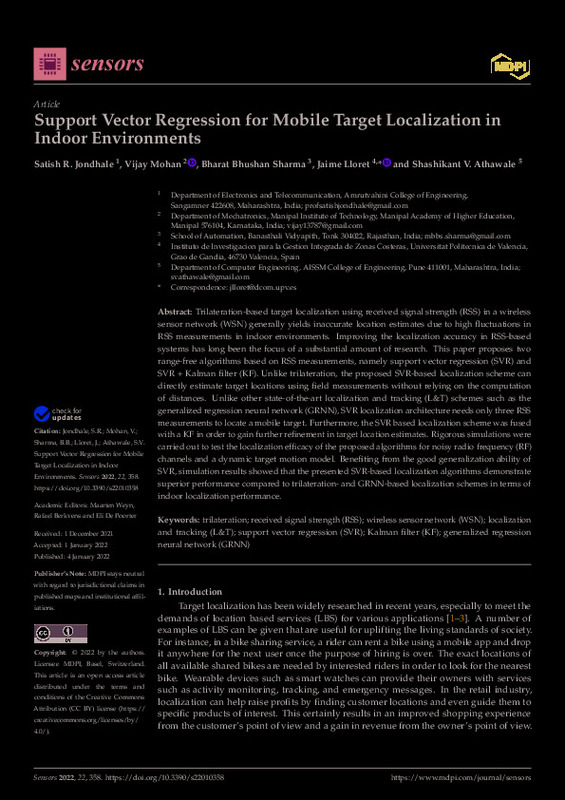JavaScript is disabled for your browser. Some features of this site may not work without it.
Buscar en RiuNet
Listar
Mi cuenta
Estadísticas
Ayuda RiuNet
Admin. UPV
Support Vector Regression for Mobile Target Localization in Indoor Environments
Mostrar el registro sencillo del ítem
Ficheros en el ítem
| dc.contributor.author | Jondhale, Satish R.
|
es_ES |
| dc.contributor.author | Mohan, Vijay
|
es_ES |
| dc.contributor.author | Sharma, Bharat Bhushan
|
es_ES |
| dc.contributor.author | Lloret, Jaime
|
es_ES |
| dc.contributor.author | Athawale, Shashikant V.
|
es_ES |
| dc.date.accessioned | 2024-01-11T19:02:03Z | |
| dc.date.available | 2024-01-11T19:02:03Z | |
| dc.date.issued | 2022-01 | es_ES |
| dc.identifier.uri | http://hdl.handle.net/10251/201813 | |
| dc.description.abstract | [EN] Trilateration-based target localization using received signal strength (RSS) in a wireless sensor network (WSN) generally yields inaccurate location estimates due to high fluctuations in RSS measurements in indoor environments. Improving the localization accuracy in RSS-based systems has long been the focus of a substantial amount of research. This paper proposes two range-free algorithms based on RSS measurements, namely support vector regression (SVR) and SVR + Kalman filter (KF). Unlike trilateration, the proposed SVR-based localization scheme can directly estimate target locations using field measurements without relying on the computation of distances. Unlike other state-of-the-art localization and tracking (L&T) schemes such as the generalized regression neural network (GRNN), SVR localization architecture needs only three RSS measurements to locate a mobile target. Furthermore, the SVR based localization scheme was fused with a KF in order to gain further refinement in target location estimates. Rigorous simulations were carried out to test the localization efficacy of the proposed algorithms for noisy radio frequency (RF) channels and a dynamic target motion model. Benefiting from the good generalization ability of SVR, simulation results showed that the presented SVR-based localization algorithms demonstrate superior performance compared to trilateration- and GRNN-based localization schemes in terms of indoor localization performance. | es_ES |
| dc.language | Inglés | es_ES |
| dc.publisher | MDPI AG | es_ES |
| dc.relation.ispartof | Sensors | es_ES |
| dc.rights | Reconocimiento (by) | es_ES |
| dc.subject | Trilateration | es_ES |
| dc.subject | Received signal strength (RSS) | es_ES |
| dc.subject | Wireless sensor network (WSN) | es_ES |
| dc.subject | Localization and tracking (L&T) | es_ES |
| dc.subject | Support vector regression (SVR) | es_ES |
| dc.subject | Kalman filter (KF) | es_ES |
| dc.subject | Generalized regression neural network (GRNN) | es_ES |
| dc.subject.classification | INGENIERÍA TELEMÁTICA | es_ES |
| dc.title | Support Vector Regression for Mobile Target Localization in Indoor Environments | es_ES |
| dc.type | Artículo | es_ES |
| dc.identifier.doi | 10.3390/s22010358 | es_ES |
| dc.rights.accessRights | Abierto | es_ES |
| dc.contributor.affiliation | Universitat Politècnica de València. Escuela Politécnica Superior de Gandia - Escola Politècnica Superior de Gandia | es_ES |
| dc.description.bibliographicCitation | Jondhale, SR.; Mohan, V.; Sharma, BB.; Lloret, J.; Athawale, SV. (2022). Support Vector Regression for Mobile Target Localization in Indoor Environments. Sensors. 22(1). https://doi.org/10.3390/s22010358 | es_ES |
| dc.description.accrualMethod | S | es_ES |
| dc.relation.publisherversion | https://doi.org/10.3390/s22010358 | es_ES |
| dc.type.version | info:eu-repo/semantics/publishedVersion | es_ES |
| dc.description.volume | 22 | es_ES |
| dc.description.issue | 1 | es_ES |
| dc.identifier.eissn | 1424-8220 | es_ES |
| dc.relation.pasarela | S\506768 | es_ES |








